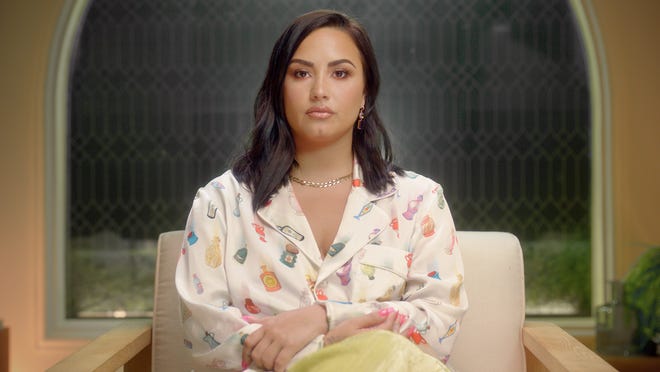USA Today – Demi Lovato isn’t holding back.
The pop singer has bravely spoken about her struggles with depression, self-harm, sobriety and an eating disorder in MTV’s 2012 documentary “Stay Strong” and YouTube’s 2017 doc “Simply Complicated.” But neither film can prepare viewers for the vulnerability and candor on display in her harrowing new YouTube docuseries “Dancing with the Devil,” which details the leadup and aftermath of her near-fatal 2018 overdose.
The four-part documentary premiered at the virtual South by Southwest festival on Tuesday night. The first two episodes will stream for free on YouTube next Tuesday, and new episodes will be released weekly on each of the next two Tuesdays. And on April 2, Lovato will release her first new album since 2017, “Dancing with the Devil … The Art of Starting Over,” which she described as a “non-official soundtrack to the documentary” in a Clubhouse livestream with fans Monday night.
Here are some of the biggest revelations from the heartbreaking yet cautiously hopeful new film:

Demi Lovato reveals she lost ‘virginity in a rape’
Throughout “Dancing with the Devil,” Lovato, 28, tries to reconcile childhood trauma brought on by her late addict father who was abusive to her mother, as well as the pressures of young fame.
Lovato had her breakthrough in the Disney Channel movie “Camp Rock” with the Jonas Brothers, which premiered in June 2008 when she was just 15. Around that time, Lovato and fellow Disney stars Selena Gomez, Miley Cyrus and the Jonas Brothers all famously wore purity rings, symbolizing they wouldn’t have sex until marriage.
Her wholesome image, coupled with her Christian upbringing, made it so that Lovato felt she had to stay silent when she was raped as a teen.
“I lost my virginity in a rape,” Lovato says in the doc. “We were hooking up but I said, ‘Hey, this is not going any farther, I’m a virgin and I don’t want to lose it this way.’ And that didn’t matter to them, they did it anyways. And I internalized it and I told myself it was my fault because I still went in the room with him, I still hooked up with him.
“I was a part of that Disney crowd that publicly said they were waiting till marriage,” she continues. “I didn’t have the romantic first time with anybody, that was not it for me and that sucked. And then I had to see this person all the time, and so I stopped eating and coped in other ways: cutting, throwing up, whatever. And my bulimia got so bad that I started throwing up blood for the first time.”
Lovato says she never went public with her experience, partly because of how Rihanna was blamed after Chris Brown assaulted her in 2009. She says she tried telling someone about what happened to her, but her rapist was never held accountable.
“Women are typically more oppressed than men, especially at 15 years old and especially as a little child-star role model,” Lovato says. “My MeToo story is me telling somebody that someone did this to me, and they never got in trouble for it. They never got taken out of the movie they were in.”
‘Discarded and abandoned’: Lovato was sexually assaulted on morning of overdose
Lovato was forced to relive her sexual trauma in summer 2018 when she was sexually assaulted the morning of her overdose. The singer had relapsed a few months earlier, after celebrating six years of sobriety in March 2018. Feeling “miserable” and overwhelmed, she attended a party where she tried meth for the first time, which she mixed with cocaine, molly (MDMA), oxycontin, marijuana and alcohol.
“I’m surprised I didn’t OD that night,” Lovato says.
Two weeks later, she was introduced to heroin and crack cocaine, which she started using recreationally but quickly became physically dependent on. She also began drinking heavily on tour, while attempting to hide her hard drug use from her friends and team.
On the night of her overdose, July 23, 2018, Lovato went to several bars with her friends and the party continued at her Los Angeles home. Once everyone left, around 5:30 a.m., she drunkenly called one of her dealers, who gave her oxycodone that she now believes was laced with fentanyl.
“I didn’t just overdose – I also was taken advantage of,” Lovato says. “I’ve had my fair share of sexual trauma throughout childhood, teenage years. And when they found me, I was naked, I was blue. I was literally left for dead after he took advantage of me.
“When I woke up in the hospital, they asked if I had had consensual sex,” she continues. “There was one flash that I had of him on top of me. I saw that flash and I said, ‘Yes.’ It wasn’t until a month after my overdose when I realized, ‘Hey, you weren’t in any state of mind to make a consensual decision.’ That kind of trauma doesn’t go away overnight.
“I was literally discarded and abandoned.
She was ‘legally blind’ in hospital, later relapsed again
On the morning of July 24, Lovato’s now-former assistant Jordan Jackson and security guard Max Lea found her unconscious in bed and called 911. After being rushed to the hospital, she suffered three strokes and a heart attack, as well as pneumonia and multiple organ failure.
“I was legally blind when I woke up,” says Lovato, who suffered brain damage from the strokes and has since regained eyesight.
“I can’t drive anymore and I have blind spots in my vision,” she says. “So sometimes when I go to pour a glass of water, I totally miss the cup because I can’t see it anymore.”
Following her near-death experience in 2018, Lovato relapsed after she attended a weeklong intensive trauma retreat. The day she returned home, she called her abuser from the night she overdosed.
“I wish I could say the last night that I ever touched heroin was the night of my overdose, but it wasn’t,” Lovato says. By seeing her abuser again, “I wanted to rewrite his choice of violating me. I wanted it now to be my choice, and he also had something that I wanted, which were drugs. I ended up getting high. I thought, ‘How did I pick up the same drugs that put me in the hospital?’ I was mortified with my decisions.
“It didn’t fix anything, it just made me feel worse,” she adds. “But that, for some reason, was my way of taking the power back.”
She now smokes weed, drinks in moderation
The documentary’s fourth chapter ends with Lovato breaking off her engagement to actor Max Ehrich last September after six months of dating.
“I rushed into something that I thought I was supposed to do,” Lovato says, telling her friends that “the hardest part of the breakup was mourning the person I thought he was.”

But the relationship’s end offered some clarity for the singer about her sexuality.
“I actually think I’m too queer to marry a man in my life right now,” says Lovato, who came out to her parents in 2017. Her new album is about “me embracing my queer self. Going for it fearlessly is where I’m at today, and what I want my music to represent, too.”
As for her mental and physical health, Lovato now receives Vivitrol injections to help curb cravings for alcohol and opioids. She also recently learned that she was misdiagnosed as bipolar when she was 18.
“I was acting out when I was 18 for many reasons, but I know now from multiple different doctors that it was not because I was bipolar,” Lovato says. “I had to grow up.”
She now chooses to smoke weed and drinks in moderation, which admittedly worries some members of her new team (including Justin Bieber’s manager Scooter Braun).
“I have full faith you’re not going to open up TMZ and see another overdose headline,” Lovato says. “But I also say this with humility that this is a very powerful disease. I’m not going to pretend like I’m invincible. I have to work every day to make sure that I’m in a good place so I don’t go to those things. Time and trust is the only thing that will work for people, and over time you’ll see that I’m good.”
If you or someone you know is struggling with substance abuse or addiction, you can call the Substance Abuse and Mental Health Services Administration National Helpline at 800-662-HELP (4357) any time of day or night.

